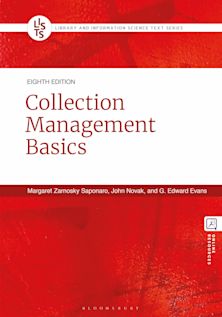Big Data Shocks
An Introduction to Big Data for Librarians and Information Professionals
Big Data Shocks
An Introduction to Big Data for Librarians and Information Professionals
You must sign in to add this item to your wishlist. Please sign in or create an account
Description
"Big data," as it has become known in business and information technology circles, has the potential to improve our knowledge about human behavior, and to help us gain insight into the ways in which we organize ourselves, our cultures, and our external and internal lives. Libraries stand at the center of the information world, both facilitating and contributing to this flood as well as helping to shape and channel it to specific purposes. But all technologies come with a price. Where the tool can serve a purpose, it can also change the user's behavior to fit the purposes of the tool. Big Data Shocks: An Introduction to Big Data for Librarians and Information Professionals examines the roots of big data, the current climate and rising stars in this world. The book explores the issues raised by big data and discusses theoretical as well as practical approaches to managing information whose scope exists beyond the human scale.
What’s at stake ultimately is the privacy of the people who support and use our libraries and the temptation for us to examine their behaviors. Such tension lies deep in the heart of our great library institutions. This book addresses these issues and many of the questions that arise from them, including:
What is our role as librarians within this new era of big data? What are the impacts of new powerful technologies that track and analyze our behavior? Do data aggregators know more about us and our patrons than we do? How can librarians ethically balance the need to demonstrate learning and knowledge creation and privacy? Do we become less private merely because we use a tool or is it because the tool has changed us? What's in store for us with the internet of things combining with data mining techniques?All of these questions and more are explored in this book
Table of Contents
Chapter 1: Defining Data
Chapter 2: The Rise of Big Data
Chapter 3: The Tools and Applications of Big Data
Part II: Reality Shocks
Chapter 4: Big Data and the Issue of Privacy
Chapter 5: Corporate Overreach in the Era of Big Data
Chapter 6: Political Spying in the Era of Big Data
Chapter 7: Information Overload and Big Data
Part III: Library Shocks
Chapter 8: Big Data, Libraries, and Collection Development
Chapter 9: Data Management Planning Strategies for Libraries in the Age of Big Data
Chapter 10: Academic Disciplines, their Data Needs, and How Libraries Can Cater to Them
Part IV: Future Shocks
Chapter 11: Libraries and the Culture of “Big Assessment”
Chapter 12: Building the “Smart Library” of the Future
Product details
| Published | 15 Mar 2018 |
|---|---|
| Format | Ebook (Epub & Mobi) |
| Edition | 1st |
| Extent | 218 |
| ISBN | 9781538103241 |
| Imprint | Rowman & Littlefield |
| Illustrations | 29 b/w photos; 1 table |
| Series | LITA Guides |
| Publisher | Bloomsbury Publishing |
About the contributors
Reviews
-
. . . this is a useful introduction to a group of subjects that will continue to become more important in the library world, particularly in academic libraries.
Technical Services Quarterly
-
I am very impressed with Big Data Shocks. It covers everything from what we mean when we talk about data to privacy, corporate overreach, social media, surveillance, as well as how data impacts libraries. This is a very useful book for all libraries, especially those in higher education.
Rebecca L. Mugridge, dean of University Libraries, University at Albany
-
What we today call ‘big data’ is both history’s best implementation of the mythical Library of Alexandria (aimed at the collection of all the world’s knowledge) and history’s best implementation of Borges’ Library of Babel (demonstrating the impossibility and futileness of such endeavor). In Big Data Shocks, Andrew Weiss takes a long overdue close look at the unavoidable fusion between libraries and big data. He rightfully calls the result ‘shocks,’ including ‘reality shocks’ and ‘future shocks.’ He also shows that these current shocks actually allow librarians and information professionals to implement their mandates better than we could have ever imagined even a few years ago. Modern big data challenges, such as privacy and corporate overreach, can benefit decisively from the lessons learned over centuries of librarianship. This is a must-read for any professional in the area.
Martin Hilbert, associate professor, department of Communication, University of California, Davis and distinguished scholar, Kuge Center, U.S. Library of Congress



































